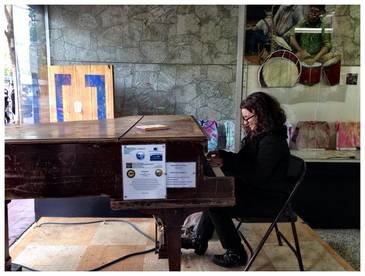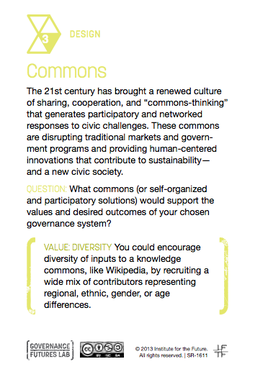Future Now
The IFTF Blog
[Freespace]: Experiencing the Commons
Your faithful social investigator hit the streets with the Inventor's Toolkit in hand to explore the opening of the new [Freespace] (1011 Market St.) in San Francisco's Central Market area. A lively crowd gathered on the sidewalk as co-founder of [Freespace] F.J. Alton "cut the ribbon" by halving a chain with a power saw. The opening night welcomed over five hundred people to this eight thousand square feet blank canvas.

Drawing from the tactical urbanism movement (small-scale projects with realistic goals and community focus that produce tactile results), [Freespace] is a project that encourages citizens to take public spaces into their own hands by giving people permission to self-organize. Pictured on the left, the [Free Piano] sits in front of the once rather 80s-inspired clothing boutique that's now [Freespace].
Anyone passing by [Freespace] is (you guessed it) free to play piano, paint on the walls, hang their photographs, donate their books, sit and read, join a discussion, hold an event, or meditate in this out-of-the-ordinary fixture of the city's landscape. Sometimes people bring in materials to make things or sometimes they share what's already been donated to the space.
Projects like these target longterm goals of community engagement; typically they must be sanctioned or supported by the city in some official capacity. San Francisco Mayor’s Office of Economic and Workforce Development supports [Freespace] through a grant. At the intersection of art, technology, governance, and place-making, [Freespace] is a coordinated effort to postively impact Central Market and Tenderloin neighborhoods as well as its low-income residents.
"In a rapidly changing city, there is a dearth of community gathering spaces where people from diverse backgrounds and experiences can meet each other, share ideas and stories, and play and create with each other," co-founder Ilana Lipsett comments.
F.J. Alton, Ilana Lipsett, Mike Zuckerman, Kyle Stewart, Ben Snyder, Brittany Ferrero, Lucas Royland, Marie Applegate, Norna Ross, Michael Seo, Michael Covington, and Adam Macon are the full-time team that give the place a sense of balance and coordinate volunteer efforts. They also uphold the two rules of [Freespace]: no money and no drugs.
Empowered by a growing network of citizens who want to see [Freespace] continue and in fact expand, their new mid-Market location is merely one node: others include Los Angeles, Paris, the Netherlands, Brazil, and the UK. The guide to starting a [Freespace] is freely accessible on GitHub.
With roots in social coding, [Freespace] was born from the inaugural National Day of Civic Hacking in June of 2013 as a response to the high energy yet liminal weekend Hackathon (a gathering where people collectively work together to solve a problem typically with tech-based solutions). Co-founder Mike Zuckerman says they wanted to "hack the hackathon" by bring popular civic innovation from the digital world to the physical.
"It's an analog version of what online platforms are — like Facebook or other social networks but in the physical realm, where programming, design, content and governance all are determined by the participants."
What he calls a "user-generated space" the "users" populate with their imagination. Users are the people who walk through the door of [Freespace] and enter this nondigital social platform. And, just like Facebook, when you enter, you have to sign in.
But [Freespace] isn't taking peoples data and then selling it to other people to use for targeted advertising, or building trap doors and peep holes for FBI agents to listen to our conversations.
More than a social platform for sharing, [Freespace] stands out as an example of nondigital civic media: what Henry Jenkins describes as any use of a medium that fosters civic engagement. (Understanding “medium” to mean the social practices or protocols that define its cultural uses as well as the technologies that enable it.)
Regardless of scholarly labels and civic duty, stop by for an afternoon and it's clear people gravitate toward [Freespace]. Curious yet bold in their explorations, citizens new to the concept seem to pick it up like an awakening of an impulse already existent.
Perhaps it's because, in this time of reorganization of public and private life, there is a need for what Peter Linebaugh calls the act of "commoning": "the self-determination of commoners in managing their shared resources."
How we think about the public sphere and how we think about the state must be brought back into the question of how we think about the commons. It seems natural to equate [Freespace] to social media platforms, which use common pools of information to make billions of dollars. But this kind of sharing is closer linked to the enclosure of the commons — where land becomes appropriated by an owner. Unfortunately it is a process we ourselves often engage and participate in, regardless of our oppositional rhetoric.
This is why the activity of commoning must be conducted through labor with other resources through acts of self-organization. The commons is not purely "the people" nor is it purely the "common pool resource." Think of the kitchen, Wikipedia, or even United Airlines flight 93—our protection is our mutuality. Shared resources facilitate people working together to create value, fostering a perspective of abundance rather than scarcity.

If [Freespace] is an urban commons, can we begin to understand creativity as a type of public utility—something useful to the public? Creative expression adds value to the experience.
Should efforts of "bottom-up zoning" like [Freespace] be formally recognized by the state through some sort of tax exemption? A donation to the urban commons could potentially release the property owner from the grind of making a profit.
With their first building, obtained for the National Day of Civic Hacking, the [Freespace] gang was able to rent out a 14,000 sq ft warehouse on Market for $1. In August, they crowdfund $26,061 for rent, utilities, and seed funding to continue projects started during the first month. Now, at their new location on 1011 Market St, the building owner's given them 3-6 months of rent free habitation.
The city of Louisville is testing out a few theories with Lots of Possibility, a program that gives away the leases of abandoned houses (with a little seed funding) to projects that range from urban bee keeping to a communal backyard BBQ.
An increasing number of blighted properties could eventually mean more urban commons. Impossible Living is trying to map these spaces of potential on the globe.
With the rise of popular civic innovation and the intentional creation of public space, there also comes governance design. How should we as citizens interface with public space and our government?
Play with the Inventor's Toolkit to design your own governance mechanisms to support the commons—then share your results with Governance Futures Lab (or find an abandoned building to test it out)!



